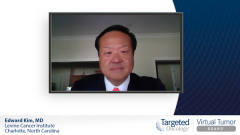
Case 1: Extensive-Stage Small Cell Lung Cancer Background
Episodes in this series

Mark Socinski, MD: Ed, is any additional work-up needed to help you inform any treatment recommendations here, or is she pretty well worked up at this point?
Edward Kim, MD: When you see these folks in clinic, sometimes with small cell cancer patients, they can be very sick, but her labs I assume are OK. She had a biopsy. It looks like it’s sensitive stage to the liver. Brain is clear, so I think I’ve got all the staging info I need with path.
Mark Socinski, MD: We’ve seen really a change in the standard of care. What would be your approach in treating this patient?
Edward Kim, MD: As you know, you and I have been doing this for long time. We kept complaining every year about targeted therapy for small cell lung cancer. Platinum-based doublets with cisplatin-etoposide, or carboplatin-etoposide, have really been the standard, and that’s what many have used. There was a period of time where we considered some drugs, but certainly it looks like cisplatin-etoposide. Now, we’ve had the addition of immunotherapy for the frontline setting. I would begin talking to her about a combination of chemotherapy and immunotherapy.
Mark Socinski, MD: How does that discussion go in your clinic with regard to extensive-stage small cell lung cancer? Historically we’ve considered this a treatable disease, but a disease that although most patients respond, you know the response is not very long lasting. If you look at progression-free landmarks at a year, it’s like 5%, 6% or so. How does that conversation go, and how has immunotherapy changed that conversation?
Edward Kim, MD: People are excited about immunotherapy. There aren’t as many commercials on as there used to be, but they’ve hit everybody. Small cell is tough; they don’t like hearing that diagnosis. They start doing a search about small cell and they see that it’s aggressive, that it’s harder to treat, that it can be very debilitating. I always find it a little tougher when patients are diagnosed with small cell, especially extensive-stage small cell. There is at least hope that we have immunotherapy treatment that has improved outcomes compared with historical treatments. That’s the mixed bag that I experienced.
Mark Socinski, MD: I’m going to ask Dr Stiles a question about the role that surgery may play in this disease. You know my training has always been, and we actually showed in the case presentation the TNM staging system. I was trained many, many years ago that you know the management of small cell may not necessarily be different from that of non–small cell if you just do it by a TNM staging. For instance, if you knew there was a T1N0 small cell, you know outcomes with surgical resection and postoperative treatment seemed to be better than we would anticipate from chemotherapy or radiotherapy.
Brendon, your perspective on this from a surgeon’s point of view? How often do you see it? What are your thoughts around it? I’d be interested in your comments.
Brendon M. Stiles MD: It’s pretty rare. I’ve definitely taken up a handful of T1A small cells, which I never quite felt good about and never really knew what to do afterward. In cases like this, I would shy away, and even in cases with mediastinal adenopathy I tend to shy away. It’s rare to find that single lesion without any lymph nodes. In that case I do feel like local therapy is appropriate and follows NCCN Guidelines. Certainly in this case I would stay far away.
Transcript edited for clarity.





















